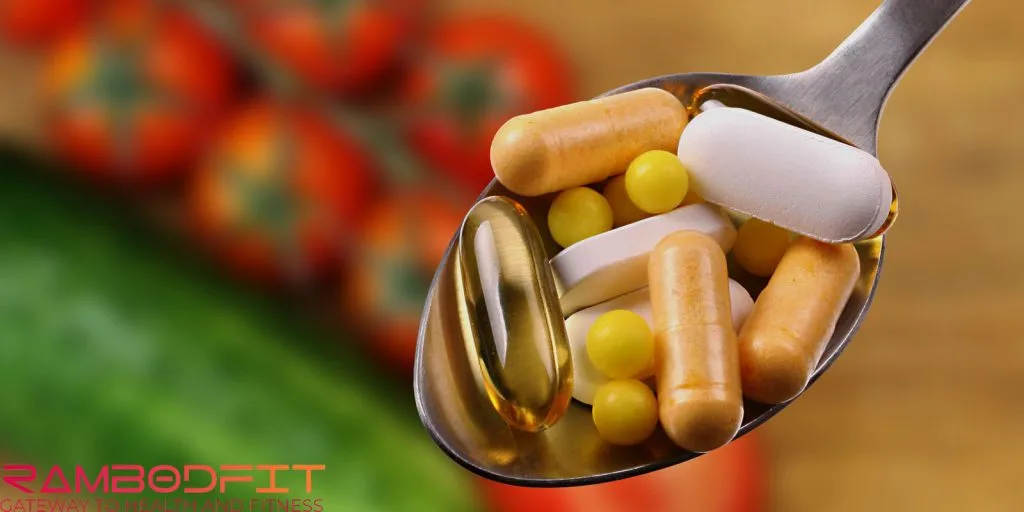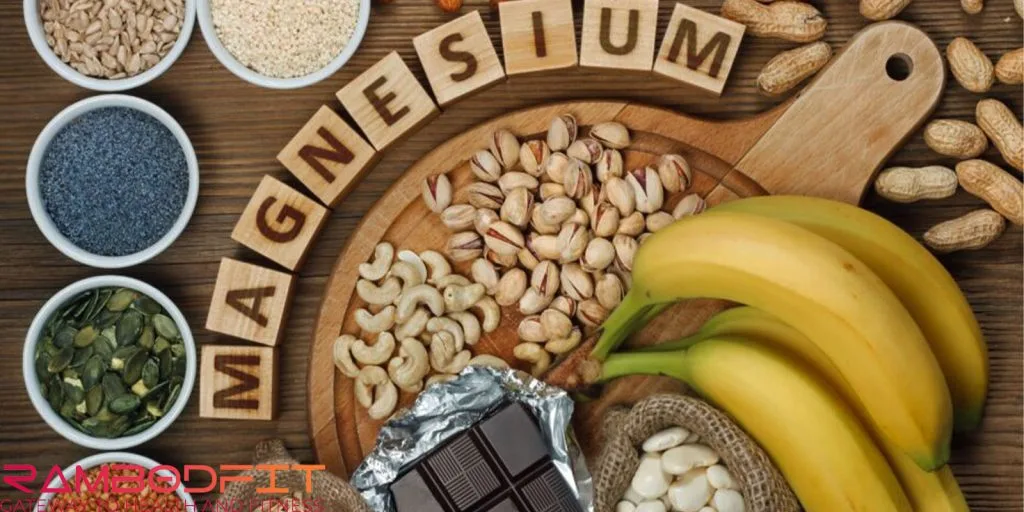


Cardio can always be a challenge if you are not properly fueled with the right macro and micronutrients. On RambodFit we will dive into the science behind the best mineral rich-foods before cardio.
As you know minerals play a crucial role in the body to have an optimized function, especially during physical activity for better performance. Let’s explore which mineral-rich foods before cardio provide the best benefits for performance in people who want to perform great before cardio training or an event.
Table of Contents

Minerals play a crucial role in functions of the body like muscle contraction, nerve signaling, and oxygen transport. By consuming mineral-rich foods before cardio you can enhance and reach your best performance.
A study titled “Role of micronutrients in physical performance and cardiovascular health” provides information about how minerals affect energy metabolism, cardiovascular function, and muscle health.
Consuming mineral-rich foods before cardio can affect the body in several ways. Here is a breakdown of the key ways minerals affect the body during cardio:
Electrolytes maintain fluid balance within cells and regulate nerve and muscle function. During cardio, sweat losses lead to a decrease in electrolytes, especially sodium and potassium.
Low levels of electrolytes can disrupt fluid balance, leading to dehydration, muscle cramps, and fatigue. Replenishing electrolytes is essential to sustain muscle contraction, prevent cramping, and avoid dehydration-related performance drops.
2. Muscle contraction and relaxation
Calcium is responsible for muscle contractions, while magnesium helps relax muscles after contractions, balancing the two actions.
During cardio, muscles repeatedly contract and relax, and adequate calcium and magnesium levels are essential to keep this cycle functioning smoothly. Low levels can lead to spasms, cramps, and early muscle fatigue, which can affect the performance of the individual.
3. Energy Production and Metabolism
Iron is crucial for oxygen transport to muscles, as it forms part of hemoglobin in red blood cells. Phosphorus and magnesium are involved in the production of ATP, the primary energy molecule that powers cells.
Without adequate oxygen transport and energy production, muscles can’t function well and get tired faster.
These minerals support efficient energy production, allowing the body to sustain aerobic activity and by consuming mineral-rich foods before cardio you can reach an optimal level of performance.
4. Oxygen Transport
Iron supports the production of hemoglobin and myoglobin, proteins that transport oxygen in the blood and muscles, respectively. During cardio, muscles need more oxygen to produce energy through aerobic pathways.
Low iron levels, often seen in endurance athletes, can impair oxygen transport, leading to fatigue and even breathlessness.
5. Antioxidant Defense and Recovery
Cardio exercise increases oxidative stress, leading to free radical production in the body. Zinc, selenium, and copper support the body’s antioxidant defense systems, reducing oxidative damage to muscles. By reducing inflammation and tissue damage, these minerals recover and reduce muscle soreness post-exercise faster.
6. Bone Health and Structural Support
Calcium and phosphorus are critical for bone density and strength, while magnesium helps with calcium absorption and utilization.
Cardio exercises, especially weight-bearing ones like running, put stress on bones. Having sufficient levels of these minerals supports strong bones, reducing the risk of injuries such as stress fractures.
7. Nerve Function and Muscle Communication
These minerals regulate nerve impulses, which coordinate muscle contractions. Sodium and potassium control electrical gradients across cell membranes, while calcium triggers muscle contractions, and magnesium helps with nerve relaxation.
Proper nerve function is essential during cardi. It ensures that muscles receive signals to contract and relax at the right times, aiding coordination and endurance.
8. Prevention of Muscle Cramps and Spasms
Magnesium and potassium are critical in preventing muscle cramps, a common issue during and after cardio.
Potassium regulates fluid balance and muscle contractions, while magnesium helps muscles relax. Low levels of these minerals can lead to muscle spasms and cramps, and by eating enough mineral-rich foods before cardio you can see the result.

1. Bananas: Rich in Potassium for Hydration and Muscle Function
Bananas are an excellent source of potassium, which helps balance electrolytes, supports proper nerve and muscle function, and prevents cramps.
A 2021 study on exercise physiology found that potassium-rich foods, like bananas, can reduce the risk of exercise-induced muscle cramps. Potassium is essential for maintaining muscle function, especially during prolonged cardio sessions.
Enjoy a banana on its own or pair it with a spoonful of almond butter or peanut butter for a balanced snack that combines carbs and healthy fats.
2. Greek Yogurt: High in Calcium and Magnesium for Muscle Performance
Greek yogurt is packed with calcium and magnesium, two minerals that support muscle contraction and relaxation. Calcium is essential for activating muscle fibers, while magnesium helps prevent cramps and aids in muscle relaxation.
According to a study published on PubMed, calcium’s role in muscle contraction makes it an important nutrient for athletes. Magnesium, on the other hand, acts as a natural muscle relaxant, preventing tightness and cramps.
Have a serving of Greek yogurt topped with fresh berries or a drizzle of honey. This combination provides both minerals and carbohydrates for sustained energy.
3. Spinach: Rich in Iron and Magnesium for Energy and Endurance
Spinach is a powerhouse of iron and magnesium, which support oxygen transport and muscle function. Iron is essential for hemoglobin production, the protein that transports oxygen to muscles, while magnesium helps generate energy from carbohydrates.
Add spinach to a smoothie, blend it into an omelet, or create a spinach-based salad for a nutrient-dense meal that promotes endurance. Combining spinach with a source of vitamin C, like bell peppers or oranges, enhances iron absorption, boosting its effectiveness.
4. Oats: Rich in Phosphorus and Zinc for Sustained Energy
Oats are packed with phosphorus and zinc, along with complex carbohydrates that release energy slowly. Phosphorus is important for producing ATP, the primary energy molecule, while zinc plays a role in muscle recovery and repair.
Prepare oatmeal topped with fruit, nuts, or seeds for a balanced pre-workout meal. Overnight oats with Greek yogurt and berries also make a great option for early-morning cardio sessions.
5. Almonds: Magnesium and Calcium for Muscle Health
Almonds provide magnesium, calcium, and healthy fats, making them an ideal pre-workout snack. Magnesium and calcium work together to support muscle contraction, while healthy fats offer a steady release of energy.
6. Quinoa: Complete Protein with Iron, Magnesium, and Potassium
Quinoa is a high-quality, plant-based protein source containing all nine essential amino acids, along with iron, magnesium, and potassium. This combination is especially useful for oxygen transport, energy production, and preventing muscle cramps.
7. Sweet Potatoes: Potassium and Magnesium for Endurance
Sweet potatoes are a fantastic source of potassium, magnesium, and complex carbohydrates, which all of them contribute to sustained energy and muscle health. The carbohydrates in sweet potatoes provide a slow-release form of energy, ideal for cardio sessions that require endurance.
8. Pumpkin Seeds: Magnesium, Iron, and Zinc for Muscle Recovery
Pumpkin seeds are rich in magnesium, iron, and zinc, which support muscle recovery, reduce inflammation, and aid in energy metabolism. Magnesium helps with muscle relaxation, iron supports oxygen transport, and zinc aids in immune function, reducing post-workout recovery time.
9. Oranges: Potassium and Vitamin C for Hydration and Immune Support
Oranges are high in potassium and vitamin C, an antioxidant that supports immune health and helps reduce oxidative stress during cardio. The potassium in oranges helps prevent cramps and dehydration, while vitamin C aids in recovery.
10. Chia Seeds: Calcium, Magnesium, and Potassium for Hydration and Muscle Health
Chia seeds have a unique ability to absorb water, forming a gel-like consistency that helps with hydration. They contain calcium, magnesium, and potassium, which support bone health, muscle function, and sustained endurance.
Incorporating these mineral-rich foods before cardio into your diet can help improve endurance, reduce fatigue, and support faster recovery. Pre-cardio nutrition plays a significant role in your performance and recovery; eating various mineral-rich foods before cardio regularly can make a significant difference in how you feel during and after your workouts.
Remember that consistency is key, enjoying a variety of these mineral-rich foods before cardio over time will provide your body with the necessary minerals to support your cardio training and overall health.
For having more info about nutrition and healthy eating Healthline can be a good choice.
Also, some other useful content about nutrition Is here that you can read:
Bananas (potassium), Greek Yogurt( calcium and magnesium)
Spinach( iron and magnesium), nuts and seeds(magnesium and zinc).
Mineral supplements can be good if you have a deficiency or you will need more minerals due to the intensity of the exercise. If you can’t get adequate micronutrients through mineral-rich foods before cardio, then you have to take supplements.